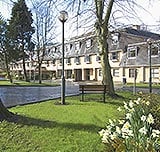
Search by region



PCI is a common cardiovascular procedure. It is performed to widen narrowed or reduce blockages in your coronary arteries (blood vessels that supply the heart). It restores the blood flow to your heart that has been deprived of oxygen and nutrients. Subsequently, symptoms such as angina (heart-related chest pain) and breathlessness are improved.
During a PCI, a tiny balloon catheter is inserted in your blocked or narrowed coronary artery under X-ray guidance. It is then inflated to stretch your artery open. This is called angioplasty.
Usually, a short wire-mesh tube, called a stent, is then inserted into your artery. The stent is left in place permanently. It helps to keep your artery open and decrease its chance of narrowing again to allow blood to flow more freely.
Often a drug-eluting stent is used which is coated with medication to reduce the risk of your artery becoming blocked again. However, you will need to take certain medications to help reduce your risk of blood clots forming around the stent. The alternative is a bare-metal stent. Your cardiologist will discuss the benefits and risks of each type of stent with you.
PCI is sometimes used as an emergency treatment for patients who have had a heart attack. An emergency coronary angioplasty for a heart attack is known as a Primary Percutaneous Coronary Intervention (PPCI).
A PCI can greatly improve your quality of life and may help you to live longer.
The benefits of a PCI include:
A percutaneous coronary intervention usually takes between 30 minutes and two hours, although it can take longer.
After a non-emergency PCI, you can expect to leave the hospital the same or the following day. You should arrange for someone to take you home.
You may have soreness and bruising where the catheter was inserted and your chest may feel tender for a few days. You can take paracetamol to relieve any pain.
Most people need to take blood-thinning medications for up to a year after a PCI. Your healthcare team will advise you on this and your recovery time.
For about a week after your PCI, you should avoid heavy lifting and strenuous activities and not drive a car. You can expect to go back to work after a week.
If you had an emergency PCI, your recovery will be slower and it may be several weeks or months until you can resume normal life and work.
You will be given advice about lifestyle changes you can make to reduce your risk of future problems. These include losing weight if you're overweight; stopping smoking if you smoke; eating a healthy low fat and low salt diet; and being active and exercising regularly.
You will receive a formal quotation price for your percutaneous coronary intervention following your consultation and any required tests with one of our expert cardiac surgeons. This formal quote will be valid for 60 days and includes unlimited aftercare.
Ramsay is recognised by all major medical insurers. PCI surgery is covered by most medical insurance policies. We advise you to obtain written authorisation from your insurance provider before your procedure.
We have a number of finance options if you are paying for your PCI yourself. These include:
Percutaneous coronary intervention is a procedure used to open narrowed or clogged heart arteries. It can restore blood flow to your heart during a heart attack.
The cardiologists at Ramsay Health Care UK are experts in PCI surgery and regularly perform this procedure. They are supported by experienced specialist nurses and physiotherapists.
You will have access to convenient appointments to discuss and assess your symptoms. Your cardiologist will request prompt cardiac tests to evaluate the condition of your arteries and to find out exactly where your blockage or narrowing is.
All Ramsay hospitals adhere to strict infection control and prevention protocols to minimise the risk of any infection, including COVID-19.



Following months of hard work from members of our mobile diagnostic team, RDUK, Ramsay's Mobile Diagnostic Unit, is proud to announce its award of the Quality Standard for Imaging (QSI) Quality Mark.
Ramsay Health Care are proud to have been recognised as 'Highly Commended' for the Excellence in Clinical Innovation HSJ Independent Healthcare Providers Awards 2025! This is a great recognition of an outstanding dedication to support of the NHS and improvement in healthcare services.
Cobalt Hospital was honoured to sponsor The Best of South Tyneside Awards 2025, recognising outstanding contributions to the community. Our team had the privilege of presenting the Unsung Hero Award to Suzanne Jackson for her inspiring dedication. A fantastic evening celebrating those who make a real difference!
The information, including but not limited to, text, graphics, images and other material, contained on this website is for educational purposes only and not intended to be a substitute for medical advice, diagnosis or treatment. Always seek the advice of your physician or other qualified health care provider with any questions you may have regarding a medical condition or treatment.
No warranty or guarantee is made that the information contained on this website is complete or accurate in every respect. The testimonials, statements, and opinions presented on our website are applicable to the individuals depicted. Results will vary and may not be representative of the experience of others. Prior patient results are only provided as examples of what may be achievable. Individual results will vary and no guarantee is stated or implied by any photo use or any statement on this website.
Ramsay Health Care UK is not currently recruiting for any roles based outside of England. If you are interested in applying for a role with Ramsay Health Care UK, please note that all available positions are advertised exclusively on our official website: https://www.ramsayhealth.co.uk/careers. Be cautious of individuals or organisations that approach you directly for remotely-based roles. Always verify the authenticity of the job offer and be careful with whom you share your personal information. For more information and advice on employment fraud, please visit: https://www.ramsayhealth.co.uk/careers/recruitment-fraud